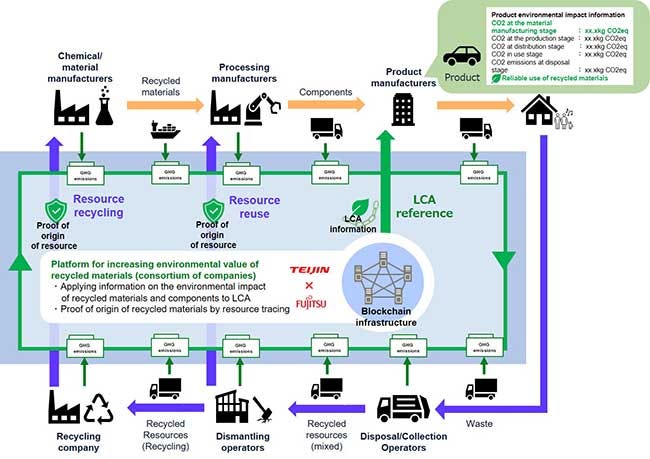Teijin and Fujitsu Use Blockchain to Improve Plastics Recycling
The new platform helps manufacturers calculate their carbon footprint and trace the origin of recycled materials.

Tokyo-based Teijin and Fujitsu have jointly developed a blockchain-based platform that supports the use of recycled plastics, promotes environmentally conscious product design, and enables manufacturers to quantify their operations’ environmental impact.
The commercial platform uses Teijin’s Life Cycle Assessment (LCA) Calculation Method to measure the impact of manufacturing processes throughout the value chain. Powered by Fujitsu’s blockchain technology, the platform can collect and track environmental-impact data.
The goal is to promote sustainable use of recycled plastics and other materials and to provide manufacturers with reliable information on the origin of recycled resources as well as data on greenhouse-gas emissions. Fujitsu’s blockchain technology ensures transparency and traceability, making it nearly impossible to falsify the data.
|
The blockchain-based platform will provide manufacturers with verifiable environmental-impact data. |
Teijin’s LCA methodology has been certified in accordance with ISO 14040 and ISO 14044. The analysis can identify carbon hot spots in manufacturing and point to options for emissions reduction. A leading manufacturer of carbon-fiber products, Teijin also promotes initiatives related to fiber-reinforced plastics (FRP) recycling.
The new blockchain platform will enable environmentally friendly design and use of recycled materials by providing manufacturers who design products from recycled plastics with accurate environmental-impact data, including proof of origin of recycled materials.
Manufacturers “mainly [in the] automotive and aerospace industries” will be the first to use the platform, a Teijin spokesperson told PlasticsToday. “FRP using our high-performance fibers, such as carbon and aramid fibers,” will initially be the core of the platform.
FRPs are used in transportation products such as aircraft and electric vehicles as well as in the construction, infrastructure, energy, and marine markets.
Manufacturers across industries face the ongoing challenge of measuring and reducing their environmental impact and boosting the environmental value of recycled plastics. Consequently, a growing number are using LCAs for insight into their carbon footprint, disclosing evaluation results, and applying for labels or certifications related to their products’ environmental-impact reductions.
However, transparency and traceability of recycled materials remain a challenge. The need for reliable information management will grow along with the trend toward verifying use of recycled plastics and other resources.
Teijin and Fujitsu plan to start full-scale trials with the blockchain platform this year. Based on trial results, the companies will consider expanding the scope of the project to include additional materials. The partners hope to develop the platform globally.
About the Author(s)
You May Also Like





